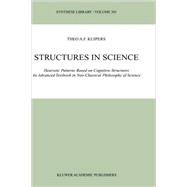
| Foreword | ix | ||||
| PART I UNITS OF SCIENTIFIC KNOWLEDGE AND KNOWLEDGE ACQUISITION | |||||
|
3 | (2) | |||
|
5 | (32) | |||
|
5 | (18) | |||
|
23 | (14) | |||
|
37 | (38) | |||
|
40 | (4) | |||
|
44 | (8) | |||
|
52 | (4) | |||
|
56 | (17) | |||
|
64 | (3) | |||
|
67 | (6) | |||
| PART II PATTERNS OF EXPLANATION AND DESCRIPTION | |||||
|
73 | (2) | |||
|
75 | (22) | |||
|
77 | (9) | |||
|
86 | (3) | |||
|
89 | (8) | |||
|
97 | (38) | |||
|
98 | (15) | |||
|
113 | (10) | |||
|
123 | (3) | |||
|
126 | (7) | |||
| PART III STRUCTURES IN INTERLEVEL AND INTERFIELD RESEARCH | |||||
|
133 | (2) | |||
|
135 | (24) | |||
|
135 | (3) | |||
|
138 | (15) | |||
|
153 | (6) | |||
|
159 | (42) | |||
|
159 | (8) | |||
|
167 | (8) | |||
|
175 | (8) | |||
|
183 | (11) | |||
|
194 | (5) | |||
| PART IV CONFIRMATION AND EMPIRICAL PROGRESS | |||||
|
199 | (2) | |||
|
201 | (28) | |||
|
203 | (10) | |||
|
213 | (8) | |||
|
221 | (8) | |||
|
229 | (26) | |||
|
229 | (9) | |||
|
238 | (5) | |||
|
243 | (10) | |||
| PART V TRUTH, PRODUCT, AND CONCEPT APPROXIMATION | |||||
|
253 | (2) | |||
|
255 | (10) | |||
|
256 | (4) | |||
|
260 | (2) | |||
|
262 | (3) | |||
|
265 | (24) | |||
|
266 | (2) | |||
|
268 | (5) | |||
|
273 | (3) | |||
|
276 | (4) | |||
|
280 | (1) | |||
|
281 | (6) | |||
| PART VI CAPITA SELECTA | |||||
|
287 | (2) | |||
|
289 | (28) | |||
|
290 | (14) | |||
|
304 | (13) | |||
|
317 | (26) | |||
|
318 | (2) | |||
|
320 | (4) | |||
|
324 | (9) | |||
|
333 | (10) | |||
|
343 | (14) | |||
|
344 | (4) | |||
|
348 | (9) | |||
| Suggestions For Further Reading | 357 | (4) | |||
| Exercises | 361 | (8) | |||
| Notes | 369 | (10) | |||
| References | 379 | (10) | |||
| Index of Names | 389 | (4) | |||
| Index of Subjects | 393 |
The New copy of this book will include any supplemental materials advertised. Please check the title of the book to determine if it should include any access cards, study guides, lab manuals, CDs, etc.
The Used, Rental and eBook copies of this book are not guaranteed to include any supplemental materials. Typically, only the book itself is included. This is true even if the title states it includes any access cards, study guides, lab manuals, CDs, etc.